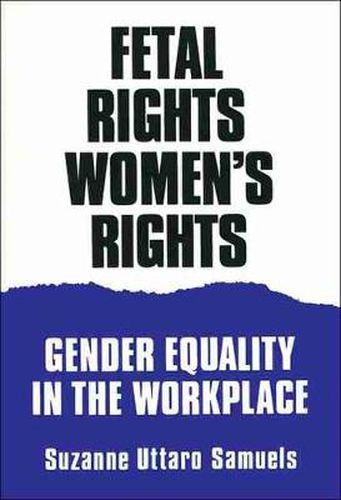Readings Newsletter
Become a Readings Member to make your shopping experience even easier.
Sign in or sign up for free!
You’re not far away from qualifying for FREE standard shipping within Australia
You’ve qualified for FREE standard shipping within Australia
The cart is loading…






This title is printed to order. This book may have been self-published. If so, we cannot guarantee the quality of the content. In the main most books will have gone through the editing process however some may not. We therefore suggest that you be aware of this before ordering this book. If in doubt check either the author or publisher’s details as we are unable to accept any returns unless they are faulty. Please contact us if you have any questions.
In the late 1970s and throughout the 1980s, many US private employers enacted foetal protection policies that barred women - that is, women who had not been surgically sterilised - from working in jobs that might expose foetuses to toxins. This text analyses these policies and the ambiguous responses to them by federal and state courts, legislatures, administrative agencies, litigants and interest groups. It poses provocative questions about the implicit links between social welfare concerns and paternalism in the workplace: are women workers or wombs? Placing the foetal protection controversy within the larger societal debate about gender roles, this text argues that government decision-makers confuse sex, which is based solely on biological characteristics, with gender, which is based on societal conceptions. It contends that the debate about foetal protection policies brought this ambiguity into stark relief, and that the response of policy-makers was rooted in assumptions about gender roles. Judges, legislators and regulators used gender as a proxy, it argues, to sidestep the question of whether the foetal protection policies could be justified by the biological differences between men and women. The foetal protection controversy highlights several intersecting issues concerning women’s roles in the workplace. Samuels discusses the effect on governmental policies of the ongoing controversy over abortion rights and the debates between egalitarian and relational feminists about the treatment of women at work. This study details the pattern of gender politics in the United States and demonstrates the broader ramifications of gender bias in the workplace.
$9.00 standard shipping within Australia
FREE standard shipping within Australia for orders over $100.00
Express & International shipping calculated at checkout
This title is printed to order. This book may have been self-published. If so, we cannot guarantee the quality of the content. In the main most books will have gone through the editing process however some may not. We therefore suggest that you be aware of this before ordering this book. If in doubt check either the author or publisher’s details as we are unable to accept any returns unless they are faulty. Please contact us if you have any questions.
In the late 1970s and throughout the 1980s, many US private employers enacted foetal protection policies that barred women - that is, women who had not been surgically sterilised - from working in jobs that might expose foetuses to toxins. This text analyses these policies and the ambiguous responses to them by federal and state courts, legislatures, administrative agencies, litigants and interest groups. It poses provocative questions about the implicit links between social welfare concerns and paternalism in the workplace: are women workers or wombs? Placing the foetal protection controversy within the larger societal debate about gender roles, this text argues that government decision-makers confuse sex, which is based solely on biological characteristics, with gender, which is based on societal conceptions. It contends that the debate about foetal protection policies brought this ambiguity into stark relief, and that the response of policy-makers was rooted in assumptions about gender roles. Judges, legislators and regulators used gender as a proxy, it argues, to sidestep the question of whether the foetal protection policies could be justified by the biological differences between men and women. The foetal protection controversy highlights several intersecting issues concerning women’s roles in the workplace. Samuels discusses the effect on governmental policies of the ongoing controversy over abortion rights and the debates between egalitarian and relational feminists about the treatment of women at work. This study details the pattern of gender politics in the United States and demonstrates the broader ramifications of gender bias in the workplace.